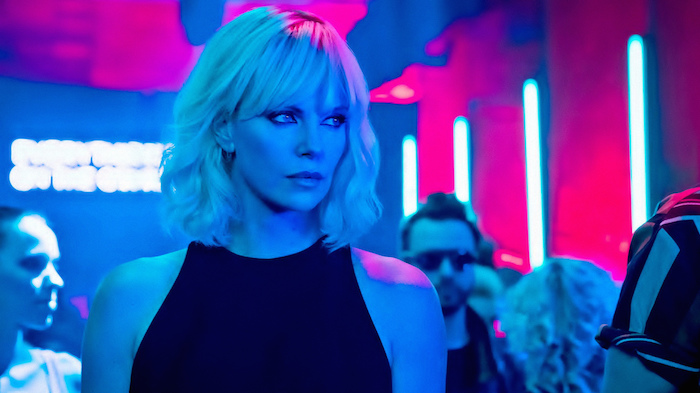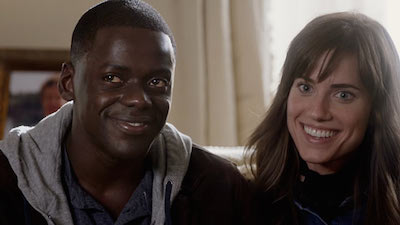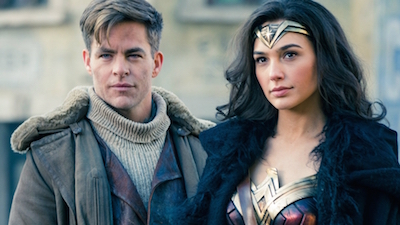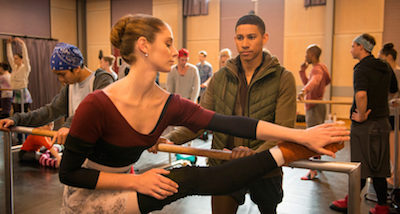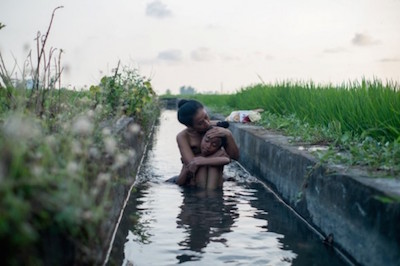PROGRESSIVE IFFR FILM ROSTER WELCOMES #FEMALEFILMMAKERFRIDAY
The five randomly selected filmmakers below represent a very small cross section of the women directors with works on show in Rotterdam. On any other day we may have profiled Lisa Bruhlmann (Blue My Mind) or Lucie Plumet (Damien Décembre); Rosine Mfetgo Mbakam (Les deux visages d'une femme Bamiléké) or Veronique Sapin (Secret, Lies and Death); Monira Al Qadari (The Craft) or Noemi Sjoberg (Shadows), themselves only a tiny fraction of those whose works are screening at the IFFR. In honour of #femalefilmmakerfriday, we offer these brief bios of five women directors contributing remarkable works to international cinema…

ANNEMARIE JACIR, Dir: Wajib
Having been recognised by the global film publication Filmmaker Magazine as one of the 25 New Faces of Independent Cinema, Palestinian-born Annemarie Jacir (pictured, above) is at the forefront of film culture, education and activism in her homeland. Her 2003 Oscar-nominated short Like Twenty Impossibles was the first Arabic short film ever granted official selection at the Cannes Film Festival. Her feature Salt of this Sea (2008) became the first film directed by a Palestinian woman and was the Palestinian entry for the Foreign Language Oscar, as was her follow-up, When I Saw You, in 2012. She founded Dreams of a Nation, an initiative to promote Palestinian cinema; was amongst the founders of the Palestinian Filmmakers Collective; and, in 2003, launched the nation’s largest travelling film festival. Her IFFR selection, Wajib (2017) is her third feature film.
DEBORAH HAYWOOD, Dir: Pin Cushion Citing Jane Campion’s Sweetie as a major influence, Brit filmmaker Haywood announced her own presence when her short film debut, Lady Margaret led to her selection as one of Screen International's 2007 Stars of Tomorrow. She quickly earned acclaim for her films Tender (2009); Sis (2011), which received Best Short at the Soho Rushes Film Festival and Best International Fiction Film at WOW Film Festival; Biatch! (2011); and, Tender Tender (2013). Pin Cushion is her feature film debut, the eccentric mother/daughter story chosen to open Critics Week at the Venice Film Festival, ahead of selection for Glasgow and Rotterdam. (Pictured, above; Haywood on the set of Pin Cushion)
Citing Jane Campion’s Sweetie as a major influence, Brit filmmaker Haywood announced her own presence when her short film debut, Lady Margaret led to her selection as one of Screen International's 2007 Stars of Tomorrow. She quickly earned acclaim for her films Tender (2009); Sis (2011), which received Best Short at the Soho Rushes Film Festival and Best International Fiction Film at WOW Film Festival; Biatch! (2011); and, Tender Tender (2013). Pin Cushion is her feature film debut, the eccentric mother/daughter story chosen to open Critics Week at the Venice Film Festival, ahead of selection for Glasgow and Rotterdam. (Pictured, above; Haywood on the set of Pin Cushion)
CYNTHIA CHOUCAIR, Dir: Counting Tiles
Born in Lebanon, Cynthia Choucair studied film at the prestigious Institut d'études scéniques audiovisuales et cinématographiques, Université Saint-Joseph in Beirut. She broadened her skills as an editor, director and producer on many Lebanese short films and documentaries, most notably Anonymes (1998), Pictures of Life (2000) and Al kursi (2002), her calling-card directorial effort that was selected by festivals worldwide. In 2007, she founded her own production house, Road 2 Films, where she produces documentaries, fiction films and cultural television programs for local Arab and European networks. Her roster of filmmakers includes such young female directors as Sandra Abrass, Lara Zakhour, Farah Kassem, Joelle Abou Chabke, Sabine Choucair and Pascale Abu Jamra. Counting Tiles exhibits all her skills as a documentarian, capturing moments of glee amongst the hardship of refugee life on Lesbos.
CHLOE ZHAO, Dir: The Rider
Of Chinese heritage, Zhao studied political science at Mount Holyoke College in the United States before completing the Graduate Film Program at New York University. Remaining based in the US, she wrote and directed a series of well-received shorts, including Post (2008), The Atlas Mountains (2009) and Daughters  (2010). Her first feature film, the Native American family drama Songs My Brothers Taught Me (2015) had its world premiere at Sundance in the US Official Competition category, ahead of its international premiere at Cannes; the film earned festival kudos at Deauville, Jerusalem and Mumbai, as well as the Audience Award at the American Film Institute Festival. Zhao's second feature The Rider (2017), a feminist western, comes to Rotterdam after its Cannes premiere, where the director won the CICAE Art Cinema Award.
(2010). Her first feature film, the Native American family drama Songs My Brothers Taught Me (2015) had its world premiere at Sundance in the US Official Competition category, ahead of its international premiere at Cannes; the film earned festival kudos at Deauville, Jerusalem and Mumbai, as well as the Audience Award at the American Film Institute Festival. Zhao's second feature The Rider (2017), a feminist western, comes to Rotterdam after its Cannes premiere, where the director won the CICAE Art Cinema Award.
LUISA SEQUERIA, Dir: Who is Barbara Virginia?
Portugese-born Luísa Sequeria studied journalism before entering the the world of filmmaking via documentary projects. Honing her craft in Mozambique at national broadcaster TVM before returning to her  homeland, where she spent a decade at Rádio e Televisão de Portugal. Since 2010 she is the artistic director of Shortcutz Porto, one of the region’s leading short film festivals, as well as overseeing the Super 9 Mobile Film Fest, a festival for films made with the mobile phone. Together with the artist Sama she created the experimental animated series Motel Sama (2014) for Canal Brazil. In her debut documentary feature, Who Is Bárbara Virgínia?, Sequeria examines the all-but-forgotten life and career of the first Portugese woman to direct a feature film.
homeland, where she spent a decade at Rádio e Televisão de Portugal. Since 2010 she is the artistic director of Shortcutz Porto, one of the region’s leading short film festivals, as well as overseeing the Super 9 Mobile Film Fest, a festival for films made with the mobile phone. Together with the artist Sama she created the experimental animated series Motel Sama (2014) for Canal Brazil. In her debut documentary feature, Who Is Bárbara Virgínia?, Sequeria examines the all-but-forgotten life and career of the first Portugese woman to direct a feature film.
 Film Festival,
Film Festival,  IFFR,
IFFR,  Women Director
Women Director 










